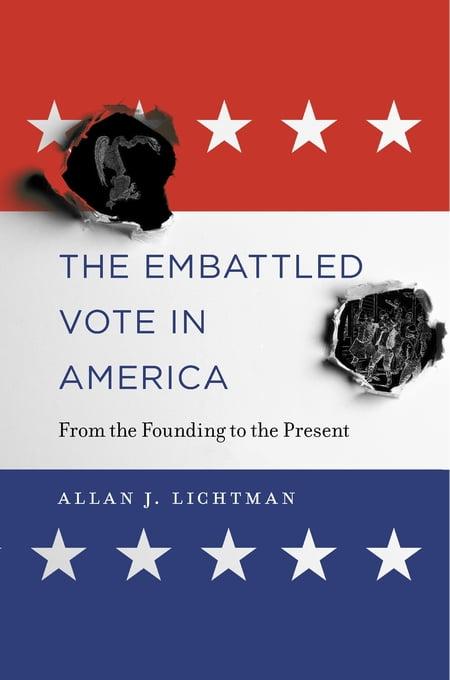The Embattled Vote in America – From the Founding to the Present
by Allan J. Lichtman 06/21/2018An alarming, important, perhaps even essential book.
A noted authority on the history of American voting returns with a disturbing account of American political leaders who have, since the beginning of the republic, worked to limit the franchise.
Americans have fought and died for the right to vote. Yet the world’s oldest continuously operating democracy guarantees no one, not even citizens, the opportunity to elect a government. In this rousing work, the best-selling author of The Case for Impeachment calls attention to the founders’ crucial error: leaving the franchise to the discretion of individual states.

For most of U.S. history, America’s political leaders have considered suffrage not a natural right but a privilege restricted by wealth, sex, race, residence, literacy, criminal conviction, and citizenship. As a result, the right to vote has both expanded and contracted over time, depending on political circumstances. In the nineteenth century, states eliminated economic qualifications for voting, but the ideal of a white man’s republic persisted through much of the twentieth century. And today, voter identification laws, political gerrymandering, registration requirements, felon disenfranchisement, and voter purges deny many millions of American citizens the opportunity to express their views at the ballot box.
We cannot blame the founders alone for America’s embattled vote. Allan Lichtman, who has testified in more than ninety voting rights cases, notes that subsequent generations have failed to establish suffrage as a universal right. The players in the struggle for the vote have changed over time, but the arguments remain familiar. Voting restrictions impose a grave injustice on the many disenfranchised Americans and stunt the growth of our democracy.
Allan J. Lichtman (History/American Univ.; The Case for Impeachment, 2017, etc.), a winner of the National Jewish Book Award, does not conceal his political preferences throughout this sturdy account; it’s abundantly clear that he is unhappy with both Donald Trump and the current GOP. Nonetheless, he marches us through the dark history of voter limitation, from the Founders to now, and the images he paints are not flattering. The Constitution itself is vague about voting rights—by design, since white male property owners had limited trust in others who did not meet their club requirements—and as Lichtman escorts us through the decades, we see an ugly pattern: people in power doing everything they can to remain so—and limiting suffrage has always been a favorite tactic. The author examines a wide variety of discrimination: by race, gender, place of origin (immigrants, as he reminds us, have rarely been welcome here). He spends a lot of time exploring the denial and suppression of the African-American vote, and he notes how such efforts have succeeded and how they continue to dampen voter turnout. His text is rich, occasionally dense, with examples. Legal challenges and court decisions, statehouse maneuvers, legislative misbehavior—all combine to leave readers with a dim view of the history of voting rights in this country. The author also explores the issue of “voter fraud” that many (who wish to limit voting rights) have long raised. As Lichtman reveals, repeated studies have found virtually no evidence of it: a tiny fraction of a single percent. At the end he offers some suggestions for renewal, including easier voter registration, a holiday for national elections, and so on.
Lichtman is Distinguished Professor of History at American University and the author of many acclaimed books on U.S. political history, including White Protestant Nation: The Rise of the American Conservative Movement, which was a finalist for the National Book Critics Circle Award, FDR and the Jews (with Richard Breitman), and The Case for Impeachment. He is regularly sought out by the media for his authoritative views on voting and elections.




No Comments so far
Jump into a conversationNo Comments Yet!
You can be the one to start a conversation.Only registered users can comment.